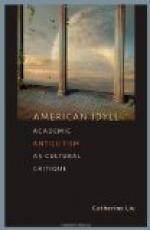But just as the crown of reportorial success was lighting on his brow, his mother made it plain to him that she preferred to have him return to college. He bought a ticket to Vacaville,—it was just about Christmas time,—purchased a loaf of bread and a can of sardines, and with thirty cents in his pocket, the extent of his worldly wealth, he left for California, traveling in a day coach all the way. I remember his story of how, about the end of the second day of bread and sardines, he cold-bloodedly and with aforethought cultivated a man opposite him, who looked as if he could afford to eat; and how the man “came through” and asked Carl if he would have dinner with him in the diner. To hear him tell what and how much he ordered, and of the expression and depression of the paying host! It tided him over until he reached home, anyhow—never mind the host.
All his mining experience, plus the dark side of life, as contrasted with society as he saw them both in Spokane, turned his interest to the field of economics. And when he entered college the next spring, it was to “major” in that subject.
May and June, 1903, he worked underground in the coal-mines of Nanaimo. In July he met Nay Moran in Idaho for his second Idaho camping-trip; and it was on his return from this outing that I met him, and ate his jerked meat and loved him, and never stopped doing that for one second.
CHAPTER III
There were three boys in the Parker family, and one girl. Each of the other brothers had been encouraged to see the world, and in his turn Carl planned fourteen months in Europe, his serious objective being, on his return, to act as Extension Secretary to Professor Stephens of the University of California, who was preparing to organize Extension work for the first time in California. Carl was to study the English Extension system and also prepare for some Extension lecturing.
By that time, we had come a bit to our senses, and I had realized that since there was no money anyhow to marry on, and since I was so young, I had better stay on and graduate from college. Carl could have his trip to Europe and get an option, perhaps, on a tent in Persia. A friend was telling me recently of running into Carl on the street just before he left for Europe and asking him what he was planning to do for the future. Carl answered with a twinkle, “I don’t know but what there’s room for an energetic up-and-coming young man in Asia Minor.”
I stopped writing here to read through Carl’s European letters, and laid aside about seven I wanted to quote from: the accounts of three dinners at Sidney and Beatrice Webb’s in London—what knowing them always meant to him! They, perhaps, have forgotten him; but meeting the Webbs and Graham Wallas and that English group could be nothing but red-letter events to a young economic enthusiast one year out of college, studying Trade-Unionism in the London School of Economics.




